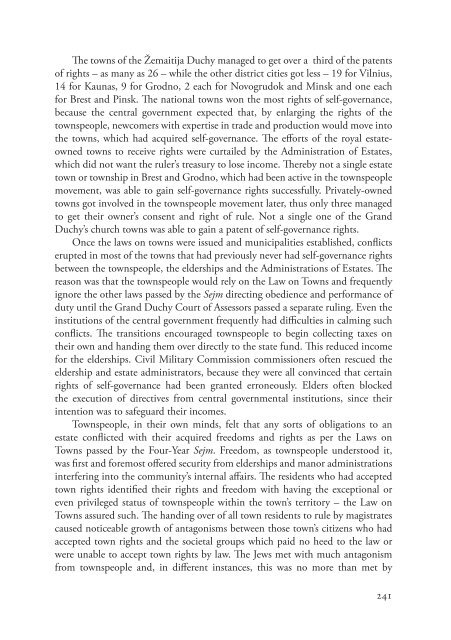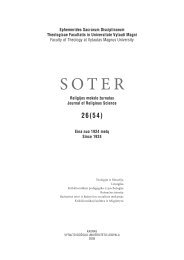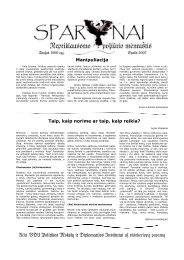Untitled - Vytauto Didžiojo universitetas
Untitled - Vytauto Didžiojo universitetas
Untitled - Vytauto Didžiojo universitetas
You also want an ePaper? Increase the reach of your titles
YUMPU automatically turns print PDFs into web optimized ePapers that Google loves.
The towns of the Žemaitija Duchy managed to get over a third of the patents<br />
of rights – as many as 26 – while the other district cities got less – 19 for Vilnius,<br />
14 for Kaunas, 9 for Grodno, 2 each for Novogrudok and Minsk and one each<br />
for Brest and Pinsk. The national towns won the most rights of self-governance,<br />
because the central government expected that, by enlarging the rights of the<br />
townspeople, newcomers with expertise in trade and production would move into<br />
the towns, which had acquired self-governance. The efforts of the royal estateowned<br />
towns to receive rights were curtailed by the Administration of Estates,<br />
which did not want the ruler’s treasury to lose income. Thereby not a single estate<br />
town or township in Brest and Grodno, which had been active in the townspeople<br />
movement, was able to gain self-governance rights successfully. Privately-owned<br />
towns got involved in the townspeople movement later, thus only three managed<br />
to get their owner’s consent and right of rule. Not a single one of the Grand<br />
Duchy’s church towns was able to gain a patent of self-governance rights.<br />
Once the laws on towns were issued and municipalities established, conflicts<br />
erupted in most of the towns that had previously never had self-governance rights<br />
between the townspeople, the elderships and the Administrations of Estates. The<br />
reason was that the townspeople would rely on the Law on Towns and frequently<br />
ignore the other laws passed by the Sejm directing obedience and performance of<br />
duty until the Grand Duchy Court of Assessors passed a separate ruling. Even the<br />
institutions of the central government frequently had difficulties in calming such<br />
conflicts. The transitions encouraged townspeople to begin collecting taxes on<br />
their own and handing them over directly to the state fund. This reduced income<br />
for the elderships. Civil Military Commission commissioners often rescued the<br />
eldership and estate administrators, because they were all convinced that certain<br />
rights of self-governance had been granted erroneously. Elders often blocked<br />
the execution of directives from central governmental institutions, since their<br />
intention was to safeguard their incomes.<br />
Townspeople, in their own minds, felt that any sorts of obligations to an<br />
estate conflicted with their acquired freedoms and rights as per the Laws on<br />
Towns passed by the Four-Year Sejm. Freedom, as townspeople understood it,<br />
was first and foremost offered security from elderships and manor administrations<br />
interfering into the community’s internal affairs. The residents who had accepted<br />
town rights identified their rights and freedom with having the exceptional or<br />
even privileged status of townspeople within the town’s territory – the Law on<br />
Towns assured such. The handing over of all town residents to rule by magistrates<br />
caused noticeable growth of antagonisms between those town’s citizens who had<br />
accepted town rights and the societal groups which paid no heed to the law or<br />
were unable to accept town rights by law. The Jews met with much antagonism<br />
from townspeople and, in different instances, this was no more than met by<br />
241





